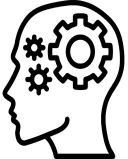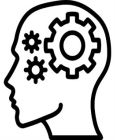Depression
How I Recovered From Depression and Anhedonia
Tips for recovering from anhedonia and depression naturally.
Posted December 18, 2019 Reviewed by Kaja Perina

I usually do not have a problem with depression or anhedonia. But a couple of years ago, I was addicted to gaming, which put me into this state more than once. Recently, I experimented with the nootropic compound Bacopa Monnieri, pursuing memory enhancement, speed of processing improvements, and general cognitive proficiency. It resulted in anhedonia, an inability to feel pleasure. The BM-induced depression resulted in worse short-term memory, the opposite of what I wanted out of the compound.
Anhedonia is one of the worst feelings you can have in my opinion; you cannot find meaning with anything in life, which inhibits motivation and spurs depression.
I don’t live a life of pursuing pleasure, but having the inability to feel it at all is neither healthy nor productive.
Having a burst of euphoria from social interactions, music, observing nature, or grasping a concept is healthy, on the other hand.
When you have anhedonia or are depressed, you struggle to find meaning in everyday life.
If you recognize yourself or someone you know in this description, read on to find some potential solutions.
This is not medical advice. If you want to avoid anti-depressants, try what helped me. However, don’t wait too long to seek professional help, it may be the best solution for you.
How I Recovered from Depression and Anhedonia
Getting to a state of mind free of depression and anhedonia will be hard.
But if you don’t give up, it will go away and all the work will be worth it.
Passion
You will more easily feel passion for something in the short-term if the end-goal is meaningful for you in the long-term (i.e. if you can envision a better future).
Be childish, curious and interested in new information.
Integrative complexity and open-mindedness are both traits of a curious mind [1]. Both are also crucial for learning.
How could you learn if you’re not open to understanding what you currently don’t or disinterested in becoming better at what you’re bad at?
Proactively exposing yourself to new situations will ultimately give you a plethora of experiences so that you can compare and contrast lines of reasoning with when you’re thinking. This is what Charlie Munger (a world-renowned investor and philosopher) calls: “a latticework of mental models”.
New experiences often culminate in laughter. Laughter is a potent anxiolytic and mood enhancer.
I have a strong sense of purpose in life; I want to help myself and other people experience more love and less suffering.
Sleep
Sleep works to reduce depression and anhedonia by reducing fatigue, improving cognitive function, and increasing motivation.
You will get 80% of the rewards with 20% of the effort if you use these three tips:
- Go to bed and wake-up at the same time every day.
- Increase exposure to light in the morning and remove exposure to light, especially screen light, in the evening.
- Don’t eat, work, or stress in the evening.
Mindfulness
Stop seeking pleasure all the time. Constant exposure to pleasurable stimuli will remove any sense of novelty in your life.
Move in small increments from where you are now to remove most sources of instant gratification in your life.
Do not use this method on its own, it will only make your anhedonia worse. Exercise, get your nutrition and sleep right, and try nootropics (e.g. supplements that enhance cognitive performance) together with small reductions in your frequency of indulging in pleasures.
Nutrition
Getting your nutrition right helps against anhedonia by at least two mechanisms.
- Giving your body the right nutrients. (Macro- and micro-.)
- Not depleting your brain’s pleasure-chemicals several times per day.
Give your body the right macro and micronutrients.
Want to learn how to eat better? Check out my intuitive nutrition principles to feel and perform well.
Don't deplete your brain’s pleasure-chemicals throughout the day.
When you cannot feel pleasure, it is normal to seek anything that closely resembles it.
Your brain is wired to overestimate the pleasure and underestimate the crash of a pizza. The first step in escaping food addiction is honesty with yourself, bringing your problem to your conscious mind. Accept that ridding yourself of anhedonia may take time and slowly but surely quit consuming junk food.
Exercise
Exercising daily reduces depression and anxiety for me. Getting a good exercise regimen into your life is a powerful tool for cognitive performance and happiness.
Exercise yields pleasure to me and I don’t need to engage in any hedonistic behavior to feel it because the pleasure is abundant from the start to the end of any exercise session.
It also increases my perception of meaning to go through pain and psychological resistance.
Exercise has many benefits in both the short and long-term.
In my experience, strength training protects me more from depression in the long-term, while cardiovascular exercise gives me breathing space from depression intra-daily.
Nootropics for depression and anhedonia
Depression and anhedonia often co-occur with lethargy and fatigue.
I believe that if you remove lethargy and fatigue by boosting your energy and motivation, your depression and anhedonia will probably go away.
Out of the best nootropics for energy and motivation, I find Cordyceps to be particularly powerful against depression and anhedonia. I successfully used it to reduce my symptoms of the nootropic-induced anhedonia.
Cordyceps
Science: Cordyceps may improve aerobic exercise performance, and reduce symptoms of depression, and pain. There is also some evidence for improved functioning of the immune system, kidney, heart, and liver after Cordyceps use.
In a study on 57 healthy older [2] people who used 1–3 g of (Cs-4) Cordyceps extract, the following was concluded:
“These findings support the belief, long held in China, that Cordyceps sinensis has the potential to improve exercise capacity and resistance to fatigue.”
However, there is not as much evidence for Cordyceps improving symptoms of fatigue in healthy young people.
My use: I use 300mg Cordyceps Militaris extract every time I do cardiovascular exercise. In my experience, it opens up airways, making it easier to breathe. The lessened level of perceived resistance in breath is motivating when running. On top of that, I believe I have better control of my body when using Cordyceps. I experience no side-effects from Cordyceps. I believe it has an antidepressant effect on me. Lack of motivation is related to depression psychologically. If you’re depressed, you’ll generally have a hard time finding meaning and motivation in your life. I find Cordyceps removes any symptoms of depression and raises motivation for me.
This post was originally published at nootralize.com. It is not a substitute for professional medical advice, diagnosis, or treatment.
References
[1] (2019). Integrative complexity. Wikipedia.
[2] Steve Chen. et al. (2010). Effect of Cs-4® (Cordyceps sinensis) on Exercise Performance in Healthy Older Subjects: A Double-Blind, Placebo-Controlled Trial. Journal of Alternative and Complementary Medicine.




